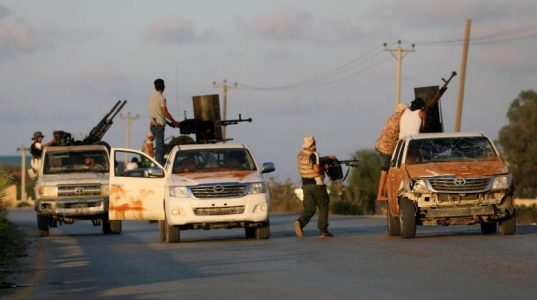
The Return of ISIS to Libya
Are Turkey and Qatar openly backing terrorists in Libya? And if so, why has the international community remained silent over the issue? Why hasn’t it taken serious action to address the situation and resolve the Libyan crisis once and for all?
As it stands, the Libyan National Army (LNA) is trying to rid the country of terrorism and terrorists. Simultaneously, intense efforts are underway to bring in ISIS members, who have fled Syria and Iraq, into Libyan regions that are controlled by militias. International intelligence agencies have the evidence to prove this.
Turkish meddling
It is no secret that Turkey and Qatar are behind the developments in Libya. Turkish President Recep Tayyip Erdogan, who failed in spreading his Islamist agenda during the so-called Arab Spring, is now attempting to make up for his losses by meddling in Libya. It represents his last hope to revive his illusions. He believes that if extremists succeed in Libya, then their influence may spread to neighboring Tunisia in the west and Egypt in the east. Egypt, he believes, spoiled his plans in recent years when the people revolted in June 2013.
Developments in Libya have exposed Ankara’s supplying of weapons to militias in flagrant violation of the arms embargo imposed on the country since 2011. Intelligence agencies received information in the past two weeks of the arrival of several Ukrainian aircraft to Tripoli from Ankara loaded with weapons for the pro-Government of National Accord (GNA) militias.
The GNA, which has lost its aerial firepower, is in much need of aerial support. It is working tirelessly to bring in drones from Turkey in an attempt to cause as much damage as possible against the LNA. Ankara has so far supplied the GNA with eight attack drones, in violation of the arms embargo.
In addition to weapons, Turkey has sent intelligence agents to support the Tripoli-based militias and terrorist groups, revealed a Libyan military source. The LNA has obtained the names of 19 Turkish officers, whom Ankara has dispatched to Libya to operate the drones.
As for Qatar, militias it supports planted French-made Javelin rockets in LNA weapons storehouses to make it appear as if it was violating the embargo. Doha has also helped the militias purchase advanced weapons from Bulgaria and later smuggled them to Libya.
ISIS return
Are Turkey and Qatar facilitating the return of ISIS to Libya? It is no secret that extremists residing in Qatar, who are affiliated with the Muslim Brotherhood and other groups, are active these days in bringing in terrorists from Iraq and Syria to Libya. While Doha exploits its transportation companies to that end, Erdogan has opened up his airports for these terrorists.
Libyan MP Ali al-Saeedi confirmed Turkey’s involvement in transporting terrorists to his country. He stressed that the extremists seek to fight the LNA during its operation against Tripoli.
Moreover, the ISIS affiliate in Libya recently reemerged in the country. The group released a video of Mahmoud al-Baraasi, known as Abu Musab al-Libi, the founder of the ISIS affiliate in Benghazi, vowing to wage attacks against the LNA. The video, which showed dozens of militants pledging allegiance to ISIS leader Abu Bakr al-Baghdadi, was likely shot in the southern region of Sabha.
In May, ISIS claimed responsibility for an attack on an oilfield in the town of Zillah, some 650 kilometers southeast of the capital Tripoli. The attack was seen as an escalation against LNA-held regions in the South.
Returning to Erdogan, what does he really want from Libya?
He is seeking to make up for his political losses in Turkey and his country’s deteriorating economy. He is set to face even greater challenges should Washington impose sanctions on Ankara over its purchase of the S-400 missile defense system from Russia.
Erdogan is ultimately eyeing Libya’s oil and gas reserves to make up for his losses back home.
During the rule of late leader Moammar al-Gaddafi, Turkish companies operated in Libya and made billions of dollars in profits. This changed with Gaddafi’s ouster. Ankara managed to establish close ties with the GNA, allowing its companies to again regain a foothold and reap interests. This again came to halt, this time when the LNA launched its operation against Tripoli in April. The army therefore, became a major threat to Turkey’s economic and financial ambitions, pushing it firmly to side with Fayez al-Sarraj’s GNA against the advancing forces.
Any end in sight?
It is obvious that the situation in Libya is complicated, compounded even further by ISIS’ threat. The crisis is now an issue of global security and Europe must step up this time and compensate for the losses that led Libya down its destructive path in the first place. The international community must also take a stand and take decisive positions against Turkey and Qatar’s ambitions.
As for the United States, its stance remains vague, but the administration of Donald Trump is definitely opposed to terrorism. As it stands, however, it is currently distracted by the crisis with Iran.
At any rate, a resolution to the Libyan crisis is unlikely in the near future, which is the best environment for radicals and terrorists to thrive. Will the world therefore, sit idly by as ISIS aspires to open a new bloody chapter, this time on the shores of the Mediterranean?
Source: aawsat





